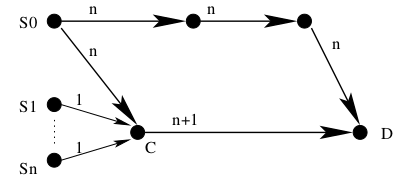
Links
Abstract
We present a new algorithm and framework for dynamic routing of bandwidth-guaranteed flows. The problem is motivated by the need to set up bandwidth-guaranteed paths in carrier and ISP networks dynamically. Traditional routing algorithms such as minimum-hop or widest-path routing do not take advantage of any knowledge about the traffic distribution or ingress-egress pairs, and therefore can often lead to severe network underutilization. Our work is inspired by the recently proposed "minimum interference routing" algorithm (MIRA) of Kodialam and Lakshman, but it improves on their approach in several ways. Our main idea is to use a "traffic profile" of the network, obtained by measurements or service-level agreements as a rough predictor of the future traffic distribution. We use this profile to solve a multi-commodity network flow problem, whose output is used both to guide our online path-selection algorithm as well as to impose admission control. The offline multi-commodity solution seems very effective at distributing the routes and avoiding bottlenecks around hot spots. In particular, our algorithm can anticipate a flow’s blocking effect on groups of ingress-egress pairs, whereas MIRA only considers one ingress-egress pair at a time. Our simulation results show that the new algorithm outperforms shortest-path, widest-path, and minimum interference routing algorithms on several metrics, including the fraction of requests routed and the fraction of requested bandwidth routed. Finally, the framework is quite general and can be extended in numerous ways to accommodate a variety of traffic management priorities in the network.
BibTeX (Download)
@article{Suri2003Profile-Based,
title = {Profile-Based Routing and Traffic Engineering},
author = {Subhash Suri and Marcel Waldvogel and Daniel Bauer and Priyank Ramesh Warkhede},
url = {https://netfuture.ch/wp-content/uploads/2003/suri03profilebased.pdf},
year = {2003},
date = {2003-01-01},
urldate = {1000-01-01},
journal = {Computer Communications},
volume = {26},
number = {4},
pages = {351--365},
abstract = { We present a new algorithm and framework for dynamic routing of bandwidth-guaranteed flows. The problem is motivated by the need to set up bandwidth-guaranteed paths in carrier and ISP networks dynamically. Traditional routing algorithms such as minimum-hop or widest-path routing do not take advantage of any knowledge about the traffic distribution or ingress-egress pairs, and therefore can often lead to severe network underutilization. Our work is inspired by the recently proposed "minimum interference routing" algorithm (MIRA) of Kodialam and Lakshman, but it improves on their approach in several ways. Our main idea is to use a "traffic profile" of the network, obtained by measurements or service-level agreements as a rough predictor of the future traffic distribution. We use this profile to solve a multi-commodity network flow problem, whose output is used both to guide our online path-selection algorithm as well as to impose admission control. The offline multi-commodity solution seems very effective at distributing the routes and avoiding bottlenecks around hot spots. In particular, our algorithm can anticipate a flow's blocking effect on groups of ingress-egress pairs, whereas MIRA only considers one ingress-egress pair at a time. Our simulation results show that the new algorithm outperforms shortest-path, widest-path, and minimum interference routing algorithms on several metrics, including the fraction of requests routed and the fraction of requested bandwidth routed. Finally, the framework is quite general and can be extended in numerous ways to accommodate a variety of traffic management priorities in the network.},
keywords = {Quality of Service, Traffic Engineering},
pubstate = {published},
tppubtype = {article}
}


